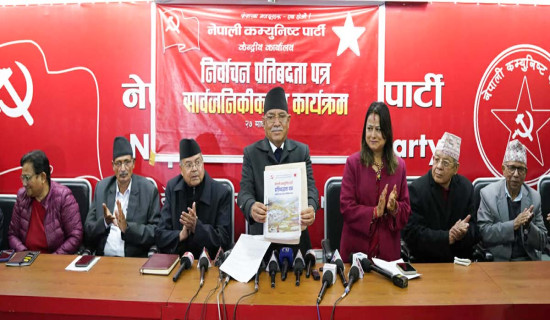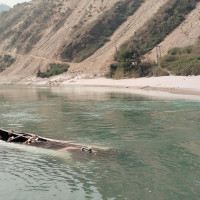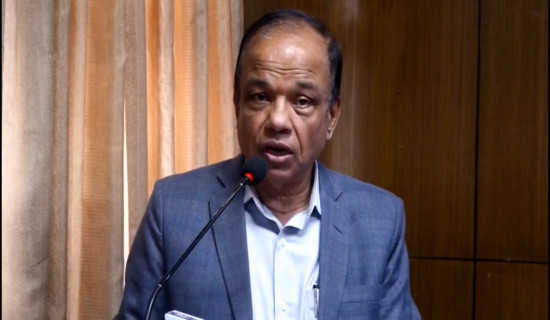- Wednesday, 11 February 2026
Intense Polarisation Besets UML
Last week, two communist parties - CPN-UML and CPN-Unified Socialist - presented two contrasting scenarios, which will have bigger implications for their organisational life. The UML saw intense polarisation over three contentious topics - the 70-year age limit, the two-term provision and the re-entry of former president Bidya Devi Bhandari. On the other hand, the CPN Unity National Campaign, led by Bamdev Gautam, has formally merged with the Unified Socialist. When the polarisation rocked the UML, Gautam’s group merger breathed new lease of life into the Unified Socialist, which is facing one crisis after another in recent times. Gautam's entry provides much-needed props to chair Madhav Kumar Nepal, who has faced moral and political pressure after he was implicated in a Patanjali land purchase scam.
Quite the contrary, the UML’s internal politics saw a dramatic twist, with chairman KP Sharma Oli, also Prime Minister, confronting unexpected opposition from his own colleagues to get his agenda endorsed by the party’s top body. At the party’s Secretariat meeting at its central office, Chyasal, Lalitpur Thursday, the UML leaders not only heatedly debated these thorny issues but also were sharply divided over them. The meeting that lasted for 10 hours decided to remove the 70-year age limit and two-term cap on the basis of majority, a development that ended the practice of settling the disputes in consensus since the election of Oli as its chairman.
Significant crack
However, the Politburo and the central committee meetings should approve the decision of the Secretariat before it is finally endorsed by the statute convention slated for early September this year. The Politburo meeting that began on Friday also saw division among its members on the two provisions that primarily aim to prevent Bhandari from participating in its statute convention. What is more striking is a significant crack that surfaced in the establishment. Senior vice-chair Ishwor Pokharel, who wholeheartedly welcomed Bidya’s admission into the party, traded barbs with Oli, much to the latter’s chagrin. Pokharel, 71, showed audacity to bell the cat after he asked Oli, 74, to step down from the party chief, stating that he has already led it for two consecutive terms.
On Friday, general secretary Shankar Pokharel and senior vice chair Pokharel locked in a verbal war over the approval of the above-mentioned two provisions via social media. Supporting the decision to ditch the 70-year age limit and two-term cap, general secretary Pokharel wrote: “The dilemma surrounding system-building has come to an end. There was a need for strong leadership and a unified party for Mission 2084. This has been ascertained.” Countering him, senior vice-chair Pokharel posted on his Facebook wall: “The party statute amendment (draft), which will be presented in its statute convention, was discussed seriously. The Politburo members will discuss it today. All comrades of the Politburo will seriously participate in the debate and contribute to further refine it.”
The UML had implemented the two-term limit for the post of chairman in its 8th general convention held in 2009 in Butwal and the age limit of 70 years during its 9th convention conducted in 2014 in Kathmandu. But the party’s secretariat meeting suspended the 70-year age limit in 2023 to welcome some old guards from the Unified Socialist. In his capacity as senior vice-chair, Pokharel has been playing only a ceremonial role in the party, as he was denied from taking up an executive role owing to the 70-year age cap. Surprisingly, Pokharel, who backed Oli in the 9th and 10th conventions, stood against Oli's third bid to lead the party, demanding inner-party democracy.
One reason that agitated Pokharel is the secretariat's decision to terminate the post of senior vice chair, which was created to manage him, though it will be applied only after the next party convention passes it. Apparently, he was humiliated when the post he was holding was rescinded right before him. In the past, Pokharel was a kingmaker in electing Madhav Kumar Nepal, Jhalanath Khanal and Oli as the party head.
Pokharel, the senior-most leader after Oli, is also the only Secretariat member who was a part of the Coordination Committee, a precursor of the then CPN-Marxist-Leninist (CPN-ML), which later unified with CPN-Marxist, led by late Manmohan Adhikari, giving birth to the present UML. CP Mainali and Madhav Kumar Nepal had a pivotal role in forming the Coordination Committee, commonly known as koke, to unite the scattered communist groups in the early 1980s. Chairman Oli was not a part of it because he was in Nakhkhu jail for his involvement in the Jhapa Uprising.
Cliff-hanger
Technically, Bidya has been denied to take part in the statute convention. Now it is up to the central committee, which will have the final say on this matter. Nonetheless, she has been aggressively engaged in party politics, expanding her support base inside and outside of it. Oli has publicly dismissed her bid to lead the party, stating that she lacks 'executive experience' for this. "Do not imagine UML sans Oli for 20/25 years," Oli has repeatedly said, warning against his opponents. He even went on to say that Bidya has not renewed her party membership. But in Friday's Politburo meeting, Kashinath Adhikari, head of the organisation department, admitted that he committed a big mistake by renewing her membership without consulting the higher-level leadership.'
Bidya is yet to comment on Oli's claim on the status of her membership. But what is visible is that she has battened down the hatches to secure the party's top post. Naturally, the establishment faction is strong inside the party as Oli is leading the government. Those dissatisfied with it or sidelined by it are now rallying behind her. Two-line struggle is a common phenomenon in the international communist movement. Such intra-party tussles sometimes become moderate and at other times ruthless and brutal. With Bhandari-Pokharel's undeclared alliance, the two-line struggle within the UML is getting more intense and a cliff-hanger from the start.
(The author is Deputy Executive Editor of this daily.)





-square-thumb.jpg)


-square-thumb.jpg)








